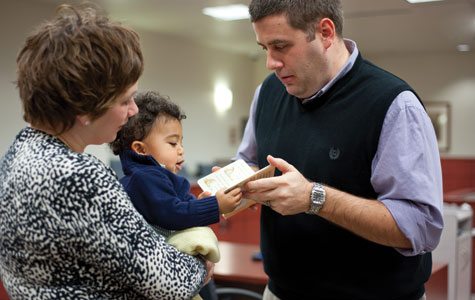The Bradleys and young Knox. Photo courtesy of Garrett & Co. Studios My son was named Owen the day the nurses at Wheaton Franciscan Healthcare–All Saints decided it should be so. They held him in their arms until we, his new parents, nervously stepped into his 2-day-old world and heard: “Congratulations! What are you going to name him?” We settled on Knox Thomas Bradley, and he is now 20 months old. Knox is a “safe haven baby,” one of 150 who have been adopted in the past 12 years after birth mothers dropped them off at approved facilities throughout Wisconsin. And…
The Bradleys and young Knox. Photo courtesy of Garrett & Co. Studios My son was named Owen the day the nurses at Wheaton Franciscan Healthcare–All Saints decided it should be so. They held him in their arms until we, his new parents, nervously stepped into his 2-day-old world and heard: “Congratulations! What are you going to name him?” We settled on Knox Thomas Bradley, and he is now 20 months old. Knox is a “safe haven baby,” one of 150 who have been adopted in the past 12 years after birth mothers dropped them off at approved facilities throughout Wisconsin. And…
My son was named Owen the day the nurses at Wheaton Franciscan Healthcare–All Saints decided it should be so. They held him in their arms until we, his new parents, nervously stepped into his 2-day-old world and heard: “Congratulations! What are you going to name him?”
We settled on Knox Thomas Bradley, and he is now 20 months old. Knox is a “safe haven baby,” one of 150 who have been adopted in the past 12 years after birth mothers dropped them off at approved facilities throughout Wisconsin. And he has been given the gift of life.
We’d spent months obtaining our foster license, only to watch three sets of siblings fall through. Then one day, I returned a call to our foster care coordinator. I remember her tone when she asked if we wanted a baby who had been born the previous day. We were given a half-hour to decide. I could hardly breathe or think clearly. I called my husband, Jonas, and he joined my state of disbelief and excitable panic. I called on my dad for advice. Without hesitation, he commanded, “You take this baby!” I’ll never forget the shaking in his voice or his crying tears of joy. Our 30 minutes were up. We were parents.
When we first met Knox, I was still processing the chaos that ensued from having just 22 hours to plan for his arrival. The long periods of anticipation and preparation that accompany being a new parent coalesced into what seemed like an instant. All for him.
Wisconsin’s safe haven law allows a mother to surrender her unharmed newborn up to 72 hours old to any firefighter, police officer, sheriff, EMT or hospital employee without fear of legal repercussions. Every state now has a safe haven law, though their timing parameters vary. The two most common, however, are three days (in 12 states) and 30 days (in 17 states, including Illinois).
Wisconsin state Rep. Dale Kooyenga (R-Brookfield) and other legislators have been working to get the law here extended to 30 days. They also want non-hospital health care clinics adopted as acceptable places to leave babies.
“To me, it’s an absolute no-brainer,” Kooyenga says. Many times, a woman is still in the hospital 72 hours after birth. And as a father, he acknowledges, “The most stressful time of being a parent is not the first three days. It is two to three weeks later when the baby keeps crying and you’re not getting sleep.”
Although the bill didn’t pass in 2012, Kooyenga says he plans to revive it in the fall. He knows opposition may be strong from father-advocacy groups as well as Native Americans who want to ensure every child of tribal descent stays within the tribe. With the anonymity of the safe haven law, there is no way to officially know a baby’s ancestry.
Tricia Burkett is the coordinator for Safe Place for Newborns, a local safe haven advocacy group that works in association with the Wheaton Franciscan–St. Joseph Foundation. She wants the time frame extended to at least a full week, but in the meantime, she’s promoting safe haven awareness through events and speaking engagements.
Burkett is also trying to reach those who have been involved with unsafe abandonments. “Doing so has given me a different perspective and an opportunity to get to the ‘why,’” she says. She visits mothers serving prison time, getting their accounts of the fear and shame that brought them to the day they gave birth and the subsequent decision to leave their babies helpless. Burkett is using their stories to reach women in similar situations, to educate them about the safe haven option. She is someone whose passion made our adoption of Knox possible.
Less than two months after Knox joined our family, our lives became fuller when a pregnancy test came back positive. Maxwell James was born in October 2012. He’s our second miracle, after five years of infertility. We filled the county courtroom that December when Knox officially became a Bradley. The judge said he’d never seen so many people present for an adoption hearing. Today, Knox adores the book the judge signed for him, Guess How Much I Love You.
Someday, we will have the privilege of explaining to this beautiful child the unique way he came to be ours. We get to tell Knox who “Owen Safehaven” was. And, most importantly, we will be able to explain that his birth mother loved him so very much that she made a choice to keep him safe.

